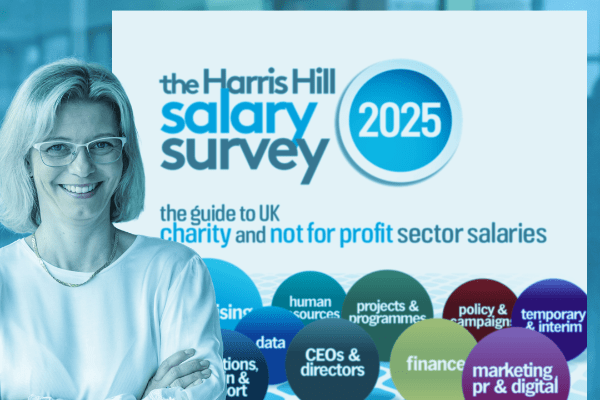
The 2024 Harris Hill Salary Survey is out now, and along with current rates for around 200 charity and not for profit positions, we look at trends in the job market by area of expertise and across the sector.
You can view or download the survey here to check out the figures, but here’s what we had to say about the market and current trends within fundraising.
|  | |
Market overview
This year’s figures (drawn from the salaries of charity and not for profit jobs in the year to 31 March 2024) tell a very different story from those of the year before, an exceptionally favourable period for candidates when their scarcity met high vacancy numbers to power above-average increases in many areas.
It wasn’t to last, however, as organisations have faced an increasingly challenging environment over the last 12 months, with costs and demand for services rising faster than funds can keep up, leaving 12% of charities (including some of the very biggest) forced to cut staff, and only 40% feeling confident they won’t have to in the year ahead.
That’s meant fewer vacancies, more available candidates, and pay rises from ‘very modest’ to ‘almost imperceptible’. Which rather makes the many official assurances in recent months that ‘wage growth is outstripping inflation’ seem bafflingly at odds with charity sector experience. So what’s really going on?

Let’s look at the numbers.
To have kept pace with inflation since it took flight in early 2022, here’s how your salary would need to have increased:
| | | ||||
| |  | |  | |  |
| | |
In annual terms that’s a rise of around 9.7%, followed by another of 7.9%, much more than we’ve seen in the sector without a new job or promotion.
Our figures align more with CharityJob’s recent estimate of a 4% average rise (based on advertised rates) in the past year, though it’s worth noting that while annual pay reviews are a given for the vast majority of the sector, an estimated 12% (NCVO) will have seen nothing at all in this period, except the value of their pay declining sharply. Either way, we’ve seen very few increases that come anywhere close to inflation, so it seems safe to say there’s been no outstripping going on around here.
That’s not to suggest that charities are short-changing staff, to be clear. Having to meet higher costs from limited funding, many are spending a higher proportion than ever on staffing, particularly since the recent minimum wage rise.
It does mean, however, that the gap between salaries in the charity sector and elsewhere – currently estimated at 7% – is growing, becoming a bigger obstacle to hiring and a greater risk to retention the more it does so.

Fundraising market trends
Even in fundraising, land of the eternal candidate shortage, organisations have eased off the salary accelerator this year, wage growth slowing to a crawl as activity has slackened across the sector.
That’s not to say there’s no movement at all, however, most of it occurring at officer/executive level – those above entry level but not yet managers – because it’s here that positions are proving the most challenging to fill.
Ideal for those with around 2-3 years’ experience, the trouble is that two or three years ago, entry level opportunities were no more plentiful than they are today, with the foreseeable-from-space consequence that such people are rarer than functioning bits of the public sector now.
Even if you’re lucky enough to land one of these elusive creatures, don’t expect to hold on to them for long: that same scarcity-driven demand means that opportunities to climb the ladder come quickly, although notably this year, they’re frequently coming from within the organisation, with internal promotions unexpectedly outnumbering external moves.

Salary vs flexibility
To state the bewilderingly obvious: salaries play a big part in attracting candidates, but these days they’re in a sequin-strewn catfight with flexibility (why I picture them as Dynasty characters is unclear) over who gets to wear the ‘Number One Factor’ sash.
Remote roles are enormously popular with candidates, who are often prepared to compromise on salary to get one, presenting cash-strapped charities with one possible route forward.
On the whole however, employers seem keen to engineer a gradual move towards more time on site, specifying a minimum of two or three days in the office, where one or two may have previously sufficed.
This doesn’t apply to all organisations equally: those directly providing services, education or care, such as hospices, typically need a bigger on-site staff presence than some of the more commercially-focused charities.

The big squeeze
On the subject of working schedules, we’ve also seen a notable rise in fundraisers seeking to compress their hours into fewer days – cramming five days’ hours into four, for example, or ten days into nine. But is there any effect on salaries?
Back at the dawn of this new flexible working world, we half-expected to see a two-tier system developing by now, led by employers offering lower rates for remote workers in light of their savings on travel.
In practice, it seems more likely to be driven by employees themselves, as along with those who will compromise on salary for a remote role, an increasing number of those required to commute are seeking (and often getting) additional payment to cover the costs of doing so.
That being said, perhaps the year’s clearest trend is the growing number of what you might call ‘hybrid jobs’, where what used to be two separate positions are combined into one – a Head of Events and Community Fundraising, for example - although in fundraising it’s primarily those at manager level who are taking on two or more people’s jobs in return for their decidedly one-person salary.
For the fundraising figures, as well as those in all other major charity departments, see the full 2024 Salary Survey here, while for help with recruiting or your job search in fundraising, please contact our fundraising specialists:
Hannah Laking | | 020 7820 7331 | | | |
Dagmara Wolosiuk-de Paula | | 020 7820 7315 | | | |
Hayley Wilson | | 020 7820 7306 | | | |
Dominic Gilchrist | | 020 7820 7332 | | |
| |

-

Opportunity for all
Find out how we’re working to deliver more diverse, equitable and inclusive recruitment…
-

Recruiting a charity CEO?
Our executive recruitment specialists have an exceptional record of successful CEO, chair, trustee and…
-

Charity sector salaries
Our 2025 Salary Survey has the latest rates and expert insight for roles throughout the sector.













